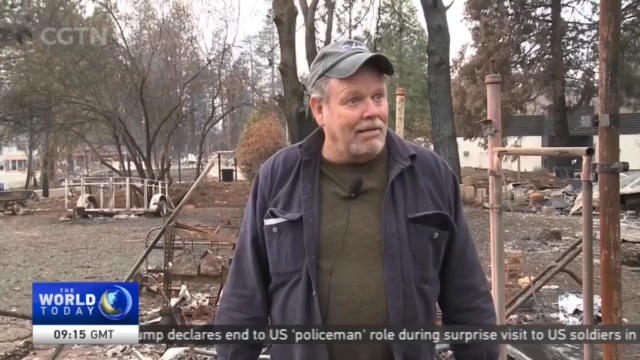
18:47, 27-Dec-2018
Starting Again: Survivors of California wild fires rebuild lives
Updated
17:46, 30-Dec-2018
03:24

Thousands of Californians are still homeless after the recent deadly wildfires. The Northern California fire known as the Camp Fire, which started in November, turned out to be the most destructive in the state's history. It killed at least 88 people and destroyed thousands of homes and other buildings. Now, residents are rebuilding their lives, while thinking about how a tragedy like this can be prevented in the future. Mark Niu has more.
More than a month after firefighters officially contained the Camp Fire, thousands are still living wherever they can get help.
Marilyn French, who has a weak immune system, has been staying at this Red Cross shelter for weeks.
MARILYN FRENCH CAMP FIRE SURVIVOR "You can't go backward. And you really can't go forward, because it hasn't come yet. So, I'm living in the moment to keep my anxiety in control."
MARK NIU BUTTE COUNTY, CALIFORNIA "Northern California's Camp Fire along with the two other recent fires in Southern California caused more than nine billion dollars in damages. Seven of the nine billion occurred in Camp Fire, like in this area of Butte County, where more than 18,000 structures were destroyed. Those are the numbers reported by the insurance companies. As more data comes in the prices tag will rise.
"Paradise was supposed to be paradise. Doesn't look like Paradise to me. Looks like a damn tragedy."
This is the first time Patrick Corbett has been back to Paradise, California, to see his home and other properties he owns.
PATRICK CORBETT PARADISE RESIDENT "It's been really hard, because you start from a landlord with an income a month and trying to help out your tenants. And then next thing you know, you are on the streets with nothing."
Corbett plans to live in a mobile home in the future. He says there are just too many trees, pine needles that all need managing.
PATRICK CORBETT PARADISE RESIDENT "The town of Paradise makes you get a permit to cut down a tree, because it's maybe an environmental deal. If you got these many people up here and you got a fire problem all around you where you have tinder in the canyon here, and a canyon here."
One of his tenants, Greg Wright, sifts through the rubble of his home, salvaging some silver dollars form his coin collection.
When the fire came, it took Wright three and a half hours to drive of town in a two-lane road traffic jam. Some people burned to their death in their cars.
GREG WRIGHT PARADISE RESIDENT "And they had to keep one side open for the police and fire trucks, ambulances and so forth. It just took forever. Make all the major cross streets four lanes."
Geography professor Christine Eriksen has come all the way from Australia several times to work with area residents to prepare for wildfires and respond to them.
CHRISTINE ERIKSEN PROFESSOR OF GEOGRAPHY UNIVERSITY OF WOLLONGONG, AUSTRALIA "There are some really important lessons to be learned in terms of cul de sacs that were dead ends. People couldn't get out. The way the density of the houses that we build."
Don Hankins is wildfire survivor who teaches geography and planning at a nearby university. As a preventative measure, he believes the area should do more controlled burns.
DON HANKINS PROFESSOR OF GEOGRAPHY AND PLANNING CALIFORNIA STATE UNIVERSITY "Once it's burned, as it's recovering, it changes the behavior of the next fires that might come in. It may stop the fire altogether or it would slow it down or take it out of the canopy and put it at the ground level."
One of many lessons to learn for the next wildfire. Those who survived the fires know there will be more. Mark Niu, CGTN, Chico, California.

SITEMAP
Copyright © 2018 CGTN. Beijing ICP prepared NO.16065310-3
Copyright © 2018 CGTN. Beijing ICP prepared NO.16065310-3